China ACG Culture
China’s Top Mobile Gaming Apps
Published
6 years agoon
By
Gabi Verberg
In a booming online gaming market, these are some of the apps most appreciated by Chinese online gamers today.
China has the largest mobile gaming market in the world. It’s an exciting market not just for game-lovers, but also for those into marketing and advertising.
One of the key drivers behind this online gaming environment is the fact that China is a mobile-first country. China’s average mobile user owns a relatively cheap but high-performance mobile phone, which enables them to play mobile games. As the quality of China’s smartphones keeps on rising, so are the possibilities and developments within China’s mobile gaming market.
The Chinese gaming industry is flourishing, but also highly controlled. Online games are allowed to be imported
To gain more insights in this enormous market, we list five of the mobile apps that currently play an important role in the mobile gaming industry. We made our selection based on the data from the Android app stores Tencent, Baidu, Huawei, and Zhushou360. We tried our best to give you a representative overview of a variety of apps that are currently most used in China, but want to remind you that these lists are by no official “top 5” charts.
This article is part of a series of five articles, listing popular Chinese apps in the categories of short video & live streaming, news, health & sports, and knowledge & education. We’ll list the other categories for you below this article, but let’s move over to review these popular mobile gaming apps now.
#1 PlayerUnknown’s Battlegrounds 绝地求生
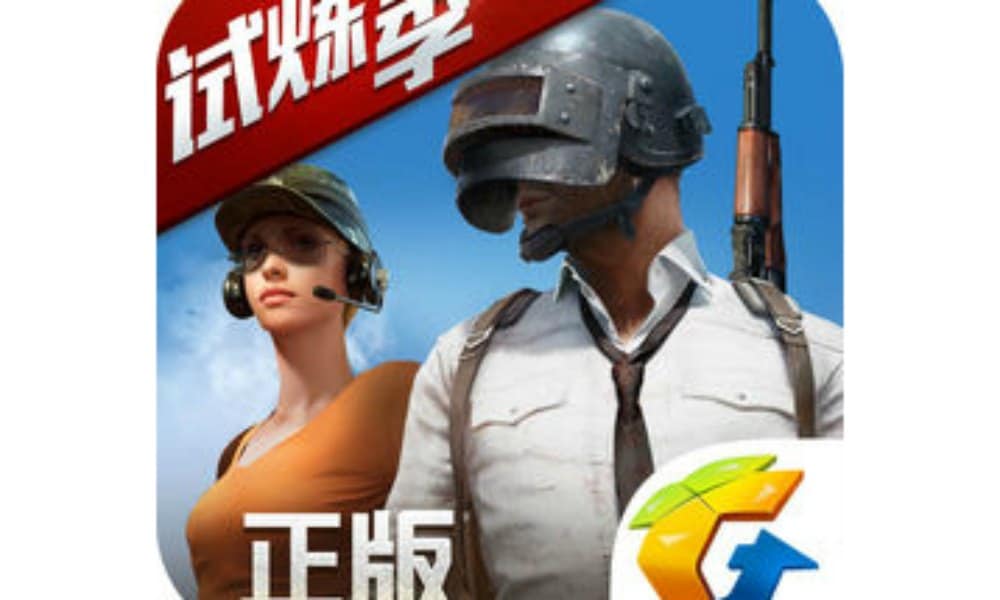
PlayersUnknown’s Battleground (PUGB) is a so-called ‘sandbox style’ survival game, which basically means that gamers are allowed to freely roam and change the game, that does not have a set storyline, and that they are required to do all they can to survive as long as possible by eliminating its competitors.
In this online multiplayer game, that is called a Fortnite rival, players are placed together with up to 100 other players on an island. As the game proceeds, the battlefield gradually shrinks, putting more pressure on its players. The users have to assemble weapons and other necessities, and in doing so, need to kill their competitors and take their possessions. The last person left is the winner.
PUBG, which is currently the most popular mobile phone game app in China, was created by the South Korean Bluehole. In 2017, Chinese gaming giant Tencent launched the mobile app version of the game. The Chinese version is not entirely the same: it has been adapted to make sure it aligns with ‘socialist values.’
At the moment, there are two versions of PUGB games: Exciting Battlefield (刺激战场) and Full Ahead (全军出击). The games Exciting Battlefield and Full Ahead subsequently ranked most and third most popular game app in the Chinese Apple stores in 2018, with Exciting Battlefield reaching 14,9 million daily active users at the end of 2018. Currently, Exciting Battlefield still ranks the most popular game app in both the Tencent and Zhushou360 app stores.
#2 Honor of Kings or Kings of Glory 王者荣耀
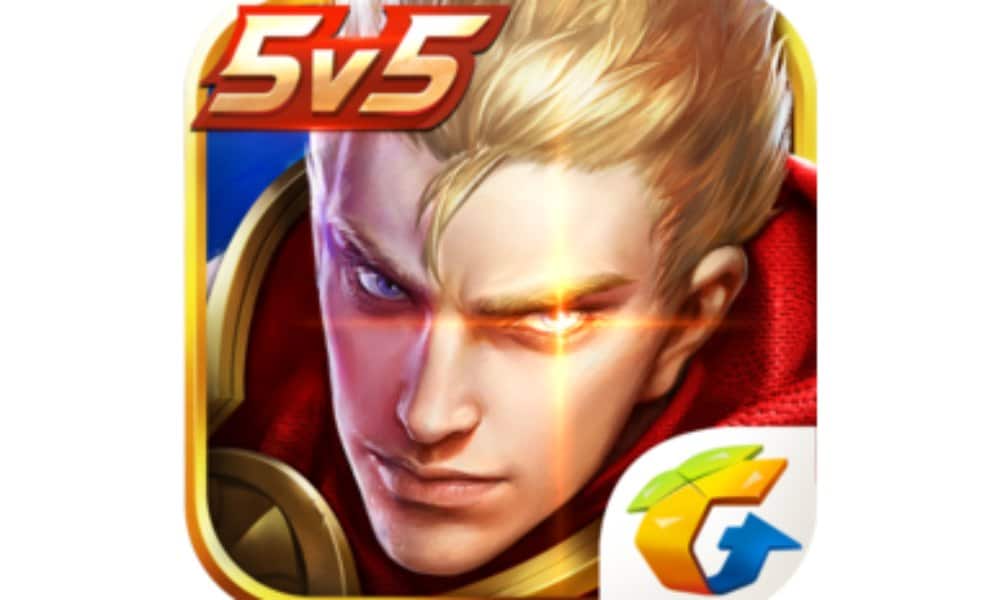
Honor of Kings is a game developed and published by Tencent which was first launched in 2015. The game is a multiplayer online battle arena game, where players have to team up for a five-to-five battle.
Every user can personally assemble their hero and equip it with certain features such as appearance, powers, etc. The goal of the game is to destroy the opponent’s base.
In 2018, Honor of Kings was the second most popular game app in the Chinese Apple store with 53,8 million daily active users in the last quarter. This year, the game especially rose in popularity during the Chinese Lunar New Year: in the week from 4-10 February, Honor of Kings reached 92 million daily active users.
But the game’s popularity isn’t limited to China. In 2017, Tencent launched an international adaption of the game called Arena of Valor. The game was adopted as one of the games at the eSport Demonstration Event at the 2018 Asian Games, where the Chinese team won the gold medal.
#3 Speed QQ / QQ飞车
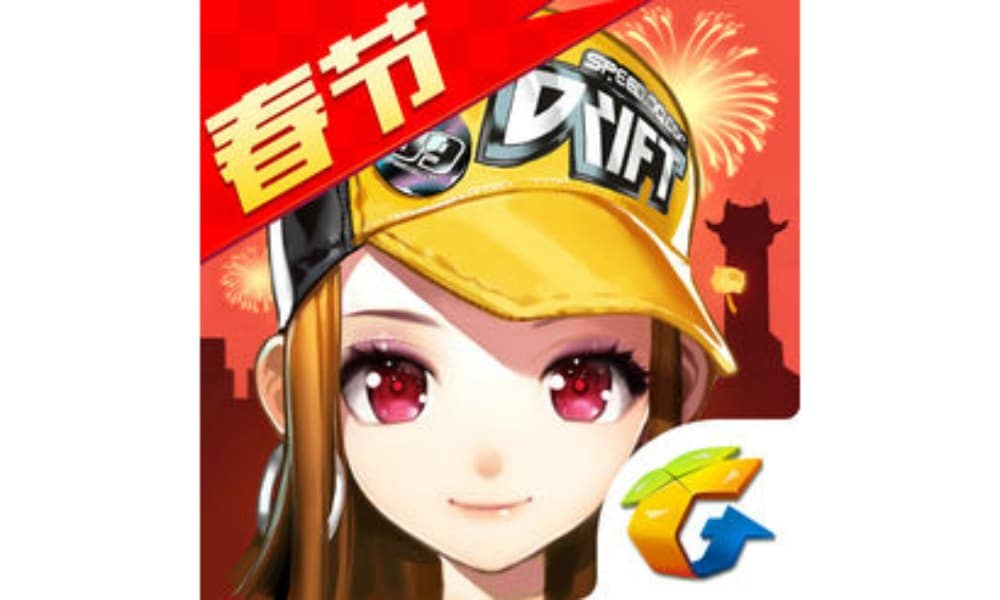
Speed QQ is a 3D game that combines both casual and competitive racing. The game has three kingdoms: wind, fire, and fantasy.
In each kingdom, there are different kinds of races, and players can move up levels if they beat other players. In the end, the strongest player of all will be crowned ‘king.’ To prove their skills, the best players of each kingdom can also race against each other in races played on racetracks on the border of the several kingdoms.
The game can be played by either a single player or multiplayer, with a maximum of six players.
Speed QQ, just as Honor of Kings and PUBG, is a game by Tencent – it is the world’s largest game distributor by revenue. Speed QQ was first launched in January 2008 as a PC version, and it was not until 2017 that the mobile app version was released.
In 2018, it became the fourth most popular game app in Chinese Apple stores, with nearly 25 million downloads in that same year.
#4 Identity V 第5人格

Identity V is a so-called asymmetric warfare game, meaning that the game is a wargame between individuals or a group of players and their hostile opponent.
The horror game, designed in gothic art style, is a one-versus-four multiplayer game. Later in the game, players can decide whether they want to play either the hunter or one of the four survivors.
However, the game is mainly a survivor-based game. The player first enters the game as a detective who receives a mysterious letter inviting the player to investigate an abandoned estate and search for a missing girl. As the player is searching for clues about the missing girl, a hunter will try to catch the player and strap it to a rocket ready for blast off. This is where the three other survivors come in; those are the ones who can free their fellow-survivor from the racket. But if they are too late, the player will be fired off and lose.
Identity V is the newest game app in our selection as it was launched in April of last year by NetEase. Despite its short period on the market, the game gained significant success. The app was the fifth most popular game app in Chinese Apple stores in 2018, with over 26 million downloads.
#5 Mini World 迷你世界

Mini World is a 3D sandbox style game, allowing its users to roam around in the virtual world of the game.
Mini World, also called a block art game, allows its players to build their world by moving around blocks and placing other elements. They can do this alone, but they can also invite friends and create a dream world together. The game closely resembles the Swedish game Minecraft (我的世界), which is also available in China.
Mini World was first launched in December 2015 by a Shenzhen based company. A couple of years later, the game was available in both Android and Apple stores. In 2018, Mini World became the fourth most popular game app in China with 3.7 million daily active users in the third quarter.
At the beginning of this year, Mini World released a new version of its game, which brings it back in the top ten most popular apps in both the Zhushou360 Appstore and Baidu Appstore.
Also see:
- Top 5 of China’s Most Popular Live Streaming and Short Video Apps
- Overview of Top 6 Chinese News Apps
- Devotion Game Taken Down in China
By Gabi Verberg, edited by Manya Koetse
Spotted a mistake or want to add something? Please let us know in comments below or email us.
©2019 Whatsonweibo. All rights reserved. Do not reproduce our content without permission – you can contact us at info@whatsonweibo.com
Gabi Verberg is a Business graduate from the University of Amsterdam who has worked and studied in Shanghai and Beijing. She now lives in Amsterdam and works as a part-time translator, with a particular interest in Chinese modern culture and politics.

You may like
China ACG Culture
“Black Myth: Wukong”: From Gaming Screens to the CMG Spring Festival Gala?
Published
6 days agoon
January 21, 2025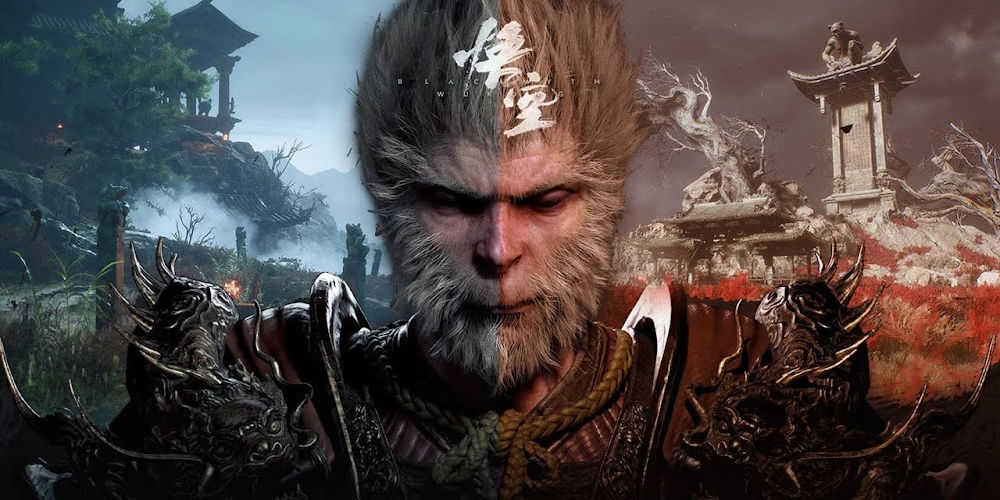
FROM THE WEIBO WATCH PREMIUM NEWSLETTER
Is Chinese game sensation ‘Black Myth Wukong’ making a jump from gaming screens to the CMG Spring Festival Gala? There’s already some online excitement over a potential performance at the biggest liveshow of the year.
The countdown to the most-watched show of the year has begun. On January 29, the Year of the Snake will be celebrated across China, and as always, the CMG Spring Festival Gala, broadcast on CCTV1, will air on the night leading up to midnight on January 28.
Rehearsals for the show began last week, sparking rumors and discussions about the must-watch performances this year. Soon, the hashtag “Black Myth: Wukong – From New Year’s Gala to Spring Festival Gala” (#黑神话悟空从跨晚到春晚#) became a topic of discussion on Weibo, following rumors that the Gala will feature a performance based on the hugely popular game Black Myth: Wukong.
Three weeks ago, a 16-minute-long Black Myth: Wukong performance already was a major highlight of Bilibili’s 2024 New Year’s Gala (B站跨年晚会). The show featured stunning visuals from the game, anime-inspired elements, special effects, spectacular stage design, and live song-and-dance performances. It was such a hit that many viewers said it brought them to tears. You can watch that show on YouTube here.
While it’s unlikely that the entire 16-minute performance will be included in the Spring Festival Gala (it’s a long 4-hour show but maintains a very fast pace), it seems highly possible that a highlight segment of the performance could make its way to the show.
Recently, Black Myth: Wukong was crowned 2024’s Game of the Year at the Steam Awards. The game is nothing short of a sensation. Officially released on August 20, 2024, it topped the international gaming platform Steam’s “Most Played” list within hours of its launch. Developed by Game Science, a studio founded by former Tencent employees, Black Myth: Wukong draws inspiration from the classic Chinese novel Journey to the West. This legendary tale of heroes and demons follows the supernatural monkey Sun Wukong as he accompanies the Tang Dynasty monk Xuanzang on a pilgrimage to India to retrieve Buddhist scriptures. The game, however, focuses on Sun Wukong’s story after this iconic journey.
The success of Black Myth: Wukong cannot be overstated—I’ve also not seen a Chinese video game be this hugely popular on social media over the past decade. Beyond being a blockbuster game it is now widely regarded as an impactful Chinese pop cultural export that showcases Chinese culture, history, and traditions. Its massive success has made anything associated with it go viral—for example, a merchandise collaboration with Luckin Coffee sold out instantly.
If Black Myth: Wukong does indeed become part of the Spring Festival Gala, it will likely be one of the most talked-about and celebrated segments of the show. If it does not come on, which we would be a shame, we can still see a Black Myth performance at the pre-recorded Fujian Spring Festival Gala, which will air on January 29.
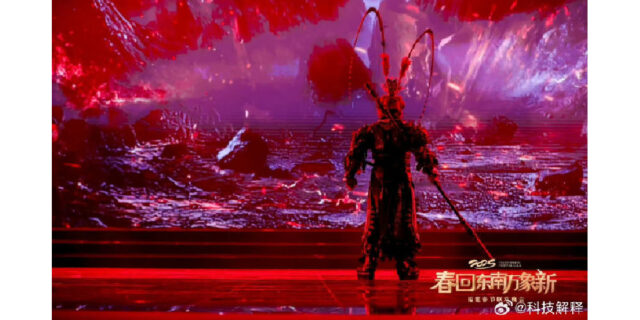
Lastly, if you’re not into video games and not that interested in watching the show, I still highly recommend that you check out the game’s music. You can find it on Spotify (link to album). It will also give you a sense of the unique beauty of Black Myth: Wukong that you might appreciate—I certainly do.
By Manya Koetse
(follow on X, LinkedIn, or Instagram)
Spotted a mistake or want to add something? Please let us know in comments below or email us. First-time commenters, please be patient – we will have to manually approve your comment before it appears.
©2025 Whatsonweibo. All rights reserved. Do not reproduce our content without permission – you can contact us at info@whatsonweibo.com.
China ACG Culture
“The End of the Golden Age of Japanese Manga”: Chinese Netizens Mourn Death of Akira Toriyama
Published
11 months agoon
March 8, 2024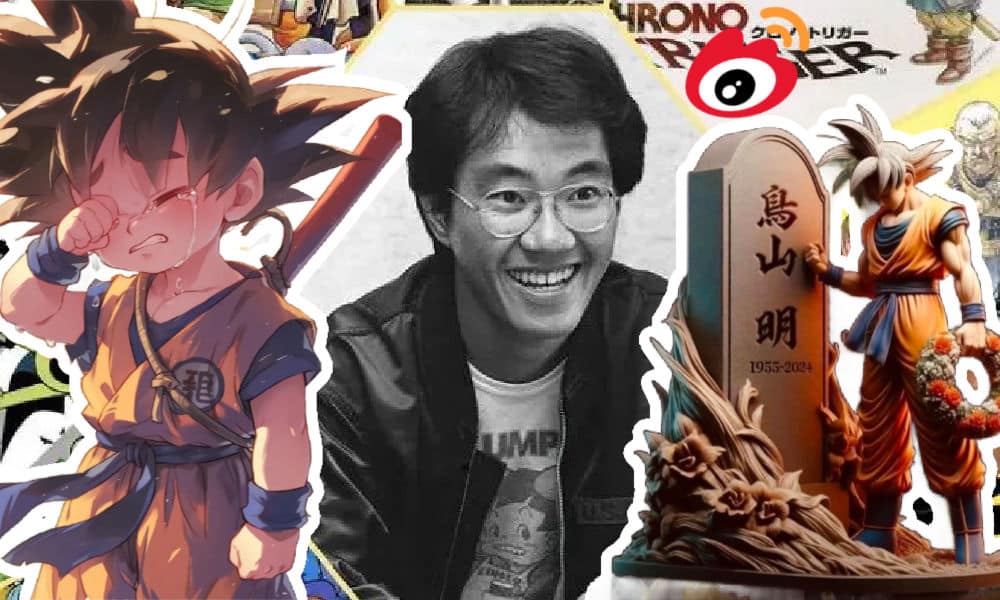
Chinese fans are mourning the death of Japanese manga artist and character creator Akira Toriyama. On Friday, his production company confirmed that the 68-year-old artist passed away due to acute subdural hematoma.
On Weibo, a hashtag related to his passing became trending as netizens shared their memories and appreciation for Toriyama’s work, as well as creating fan art in his honor.
The tribute to Toriyama reached beyond online fans – even spokesperson Mao Ning (毛宁) for the Ministry of Foreign Affairs of China expressed condolences during a regular press conference held on Friday (#外交部对漫画家鸟山明去世表示哀悼#).
Throughout his career, Toriyama created various works, but he is best known for his manga “Dragon Ball,” which was published between 1984-1995 in the magazine Shonen Jump and spawned TV series, films, and video games.
Chinese Love for “Dragon Ball”
Japanese comics and anime have had a significant impact on Chinese popular culture. In China, one of the largest comics markets globally, Japanese manga has been a major import since the 1980s.
Chinese readers form the largest fan community for Japanese comics and anime, and for many Chinese, the influential creations of Akira Toriyama, like “Dr. Slump” and particularly “Dragon Ball,” are cherished as part of their childhood or teenage memories (Fung et al 2019, 125-126).
The cultural link between Toriyama’s “Dragon Ball” and Chinese readers goes further than their mere appreciation for Japanese manga/anime. Toriyama drew inspiration from the Chinese book Journey to the West when he initially created the “Dragon Ball” story. That epic tale, filled with heroes and demons, revolves around supernatural monkey Sun Wukong who accompanies the Tang dynasty monk Xuanzang on a pilgrimage to India to obtain Buddhist sūtras (holy scriptures).
“Dragon Ball” chronicles the adventures of Son Goku, a superhuman boy with a monkey tail, who who is swept into a series of adventures connected to the wish-granting, magical dragon balls, sought after by his evil enemies.
Besides Journey to the West, “Dragon Ball” is filled with many other China-related references and word games, from Chinese mythology to martial arts (Mínguez-López 2014, 35).
In one online poll conducted by Sina News asking Weibo users if “Dragon Ball” is part of their childhood memories, a majority of people responded that the manga series was part of their post-1980s and post-1990s childhood, although younger people also indicated that they loved “Dragon Ball.”
Online Tributes to Toriyama
On Friday, many bloggers and online creators posted images and art to honor Akira Toriyama. Several images went viral and were reposted thousands of times.
Chinese graphic design artist Wuheqilin (@乌合麒麟) dedicated a particularly popular post and image to Toriyama, suggesting that his death symbolized “the end of the golden age of Japanese manga.”
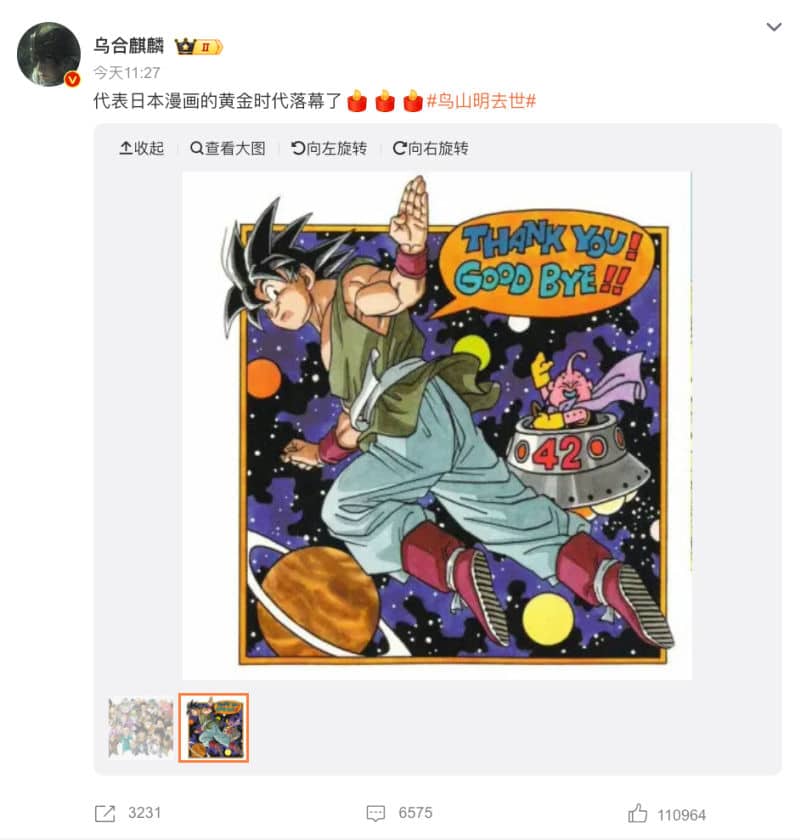
Weibo post by Wuheqilin, March 8 2024.
Shituzi (@使徒子), a Chinese comic artist, posted an image for Toriyama with the words “goodbye.”
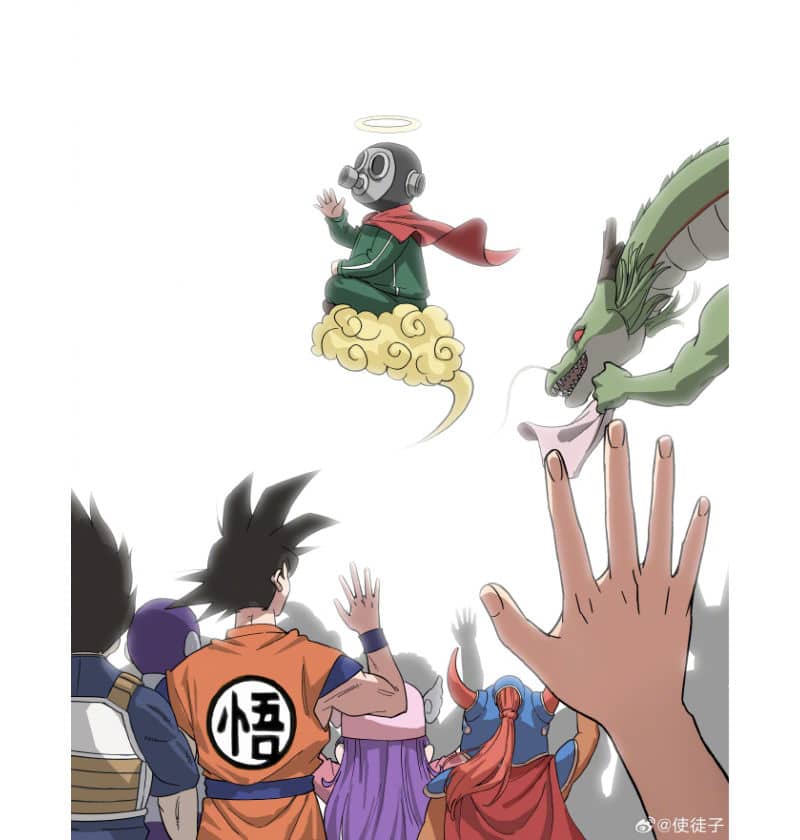
Posted by @使徒子.
Chinese comedian Yan Hexiang (阎鹤祥) wrote: “I just bought the Dr. Slump series online. I thank you for bringing me the memories of my childhood, I salute you.”
Weibo is flooded with tribute art honoring Japanese manga artist & Dragon Ball creator Akira Toriyama today. The famous artist, who passed away at the age of 68, holds a special place in the hearts of Chinese fans. This image was shared by Chinese comic artist Shituzi (使徒子) 👇 pic.twitter.com/wsUukRa2dp
— Manya Koetse (@manyapan) March 8, 2024
Automotive blogger Chen Zhen (陈震) posted an image of Dragon Ball protagonist Son Goku with wings on his back, waving goodbye, writing: “Rest in peace.”
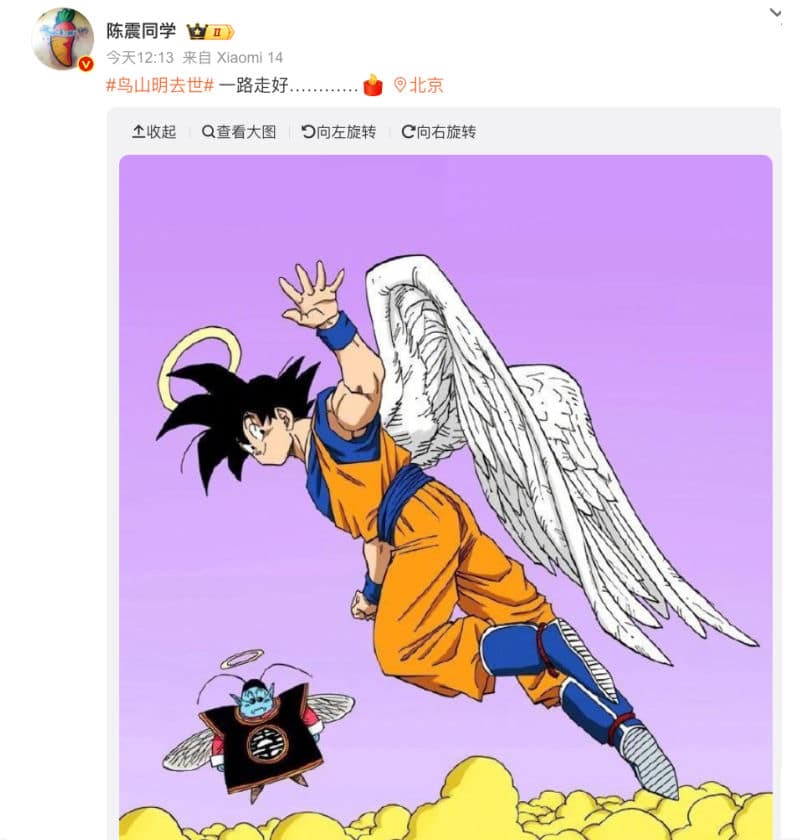
Image posted by @陈震同学.
One Dragon Ball fan (@小佛手绘) posted another AI-generated image of Son Goku standing by Toriyama’s grave which was shared all over Weibo.
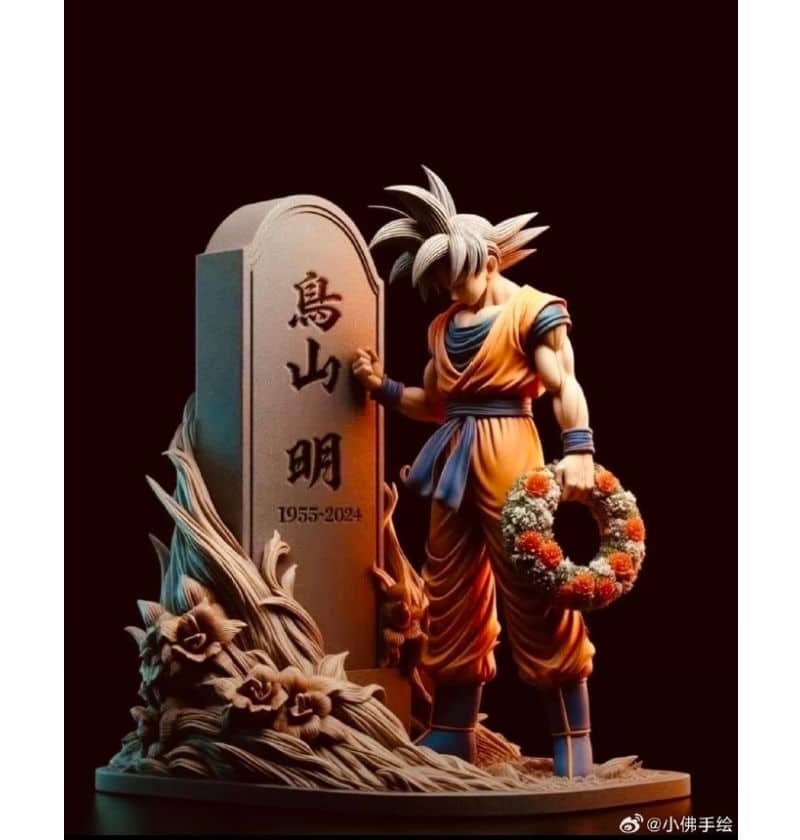
Posted or reposted by Weibo user @小佛手绘.
By Friday night, the hashtag “Akira Toriyama Passed Away” (#鸟山明去世#) had generated over one billion views on Weibo, showing just how impactful Toriyama’s work has been in China – a legacy that will last long after his passing.
By Manya Koetse
References
Fung, Anthony, Boris Pun, and Yoshitaka Mori. 2019. “Reading Border-Crossing Japanese Comics/Anime in China: Cultural Consumption, Fandom, and Imagination.” Global Media and China 4, no. 1: 125–137.
Xavier Mínguez-López. 2014. “Folktales and Other References in Toriyama’s Dragon Ball.” Animation: An Interdisciplinary Journal. Vol. 9 (1): 27–46.
Get the story behind the hashtag. Subscribe to What’s on Weibo here to receive our newsletter and get access to our latest articles:
Spotted a mistake or want to add something? Please let us know in comments below or email us. First-time commenters, please be patient – we will have to manually approve your comment before it appears.
©2024 Whatsonweibo. All rights reserved. Do not reproduce our content without permission – you can contact us at info@whatsonweibo.com.
What’s on Weibo Chapters
Subscribe

Tuning Into the Year of the Snake

The ‘China-chic Girl’ Image and the Realities of China’s Competitive Food Delivery Market

From “Public Megaphone” to “National Watercooler”: Casper Wichmann on Weibo’s Role in Digital China

“Black Myth: Wukong”: From Gaming Screens to the CMG Spring Festival Gala?

“Dear Li Hua”: The TikTok/Xiaohongshu Honeymoon Explained

The Price of Writing Smut: Inside China’s Crackdown on Erotic Fiction

Controversial Wanghong Livestreamers Are Becoming a Weibo Staple in China

Weibo Watch: “Comrade Trump Returns to the Palace”

The ‘Cycling to Kaifeng’ Trend: How It Started, How It’s Going

Hu Xijin’s Comeback to Weibo

Our Picks: Top 10 Chinese Buzzwords and Phrases of 2024 Explained

The Viral Bao’an: How a Xiaoxitian Security Guard Became Famous Over a Pay Raise

Why Chinese Hit Movie “Her Story” is ‘Good Stuff’: Stirring Controversy and Celebrating Female Perspectives

Chiung Yao’s Suicide Farewell Letter: An English Translation

“Dear Li Hua”: The TikTok/Xiaohongshu Honeymoon Explained
Get in touch
Would you like to become a contributor, or do you have any tips or suggestions? Get in touch here!
Popular Reads
-

 China Insight9 months ago
China Insight9 months agoThe Tragic Story of “Fat Cat”: How a Chinese Gamer’s Suicide Went Viral
-

 China Music10 months ago
China Music10 months agoThe Chinese Viral TikTok Song Explained (No, It’s Not About Samsung)
-

 China Insight11 months ago
China Insight11 months agoThe ‘Two Sessions’ Suggestions: Six Proposals Raising Online Discussions
-

 China Digital8 months ago
China Digital8 months agoChina’s 2024 Gaokao Triggers Online Discussions on AI





